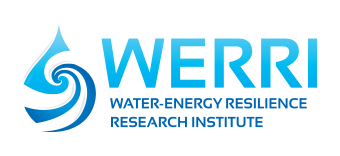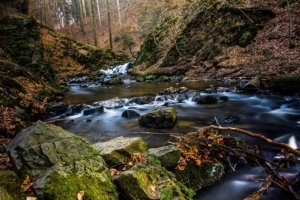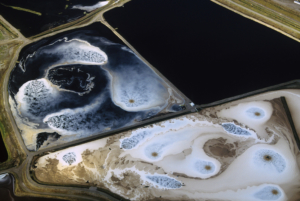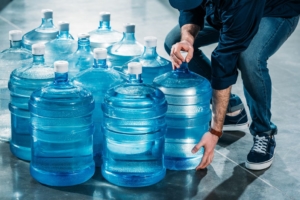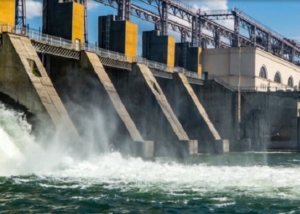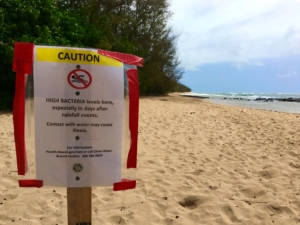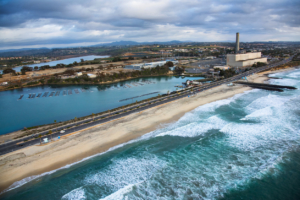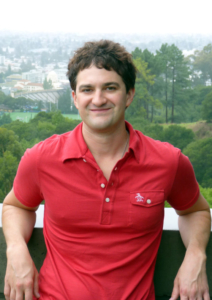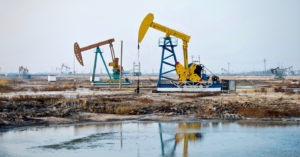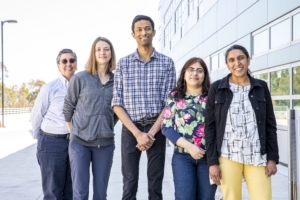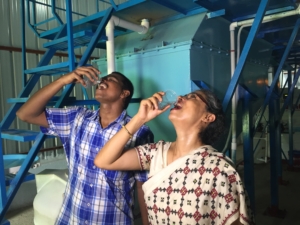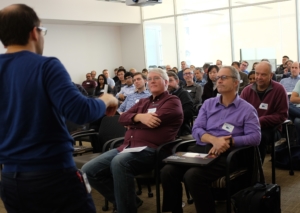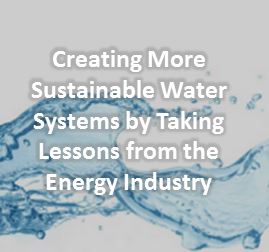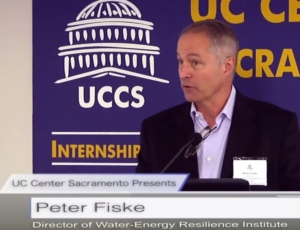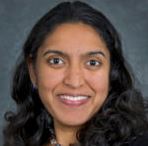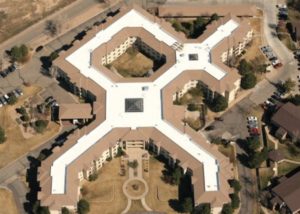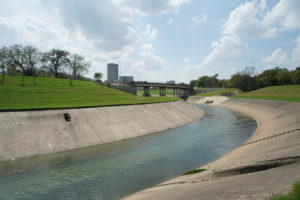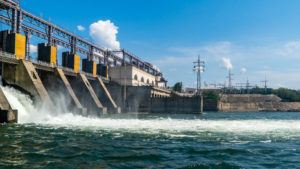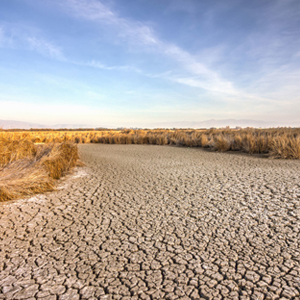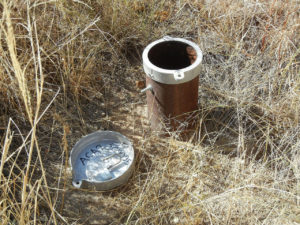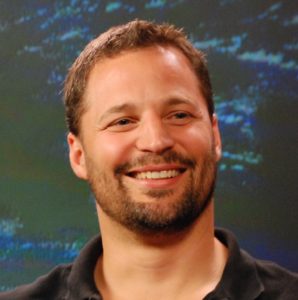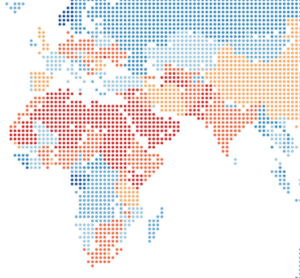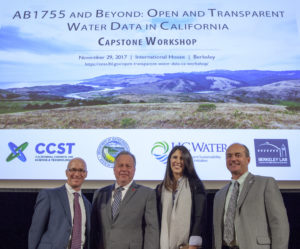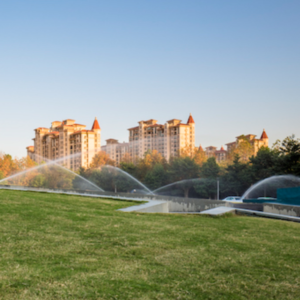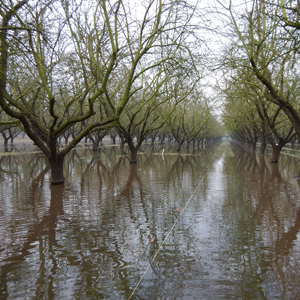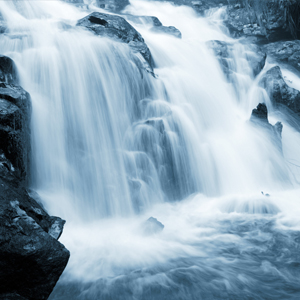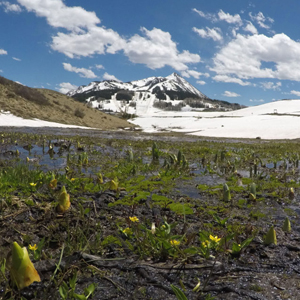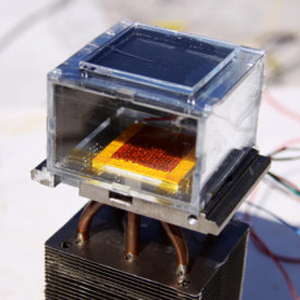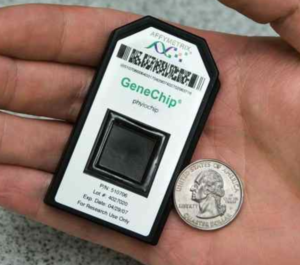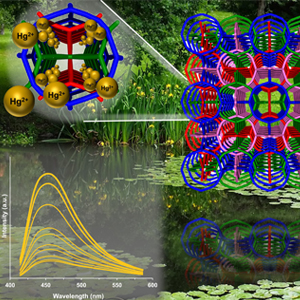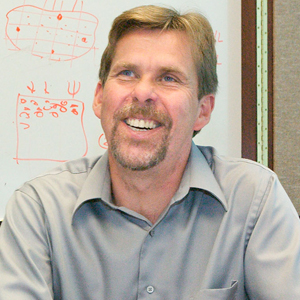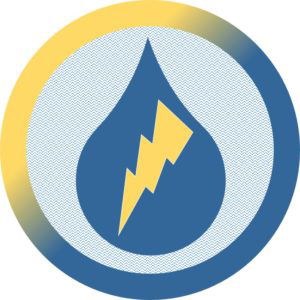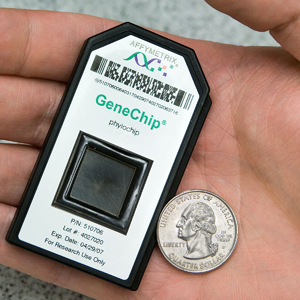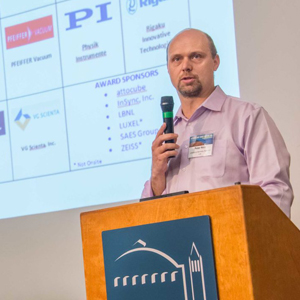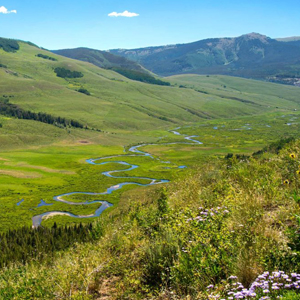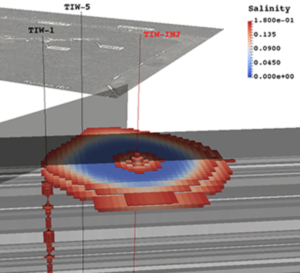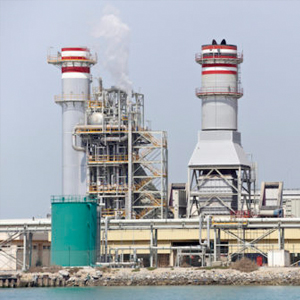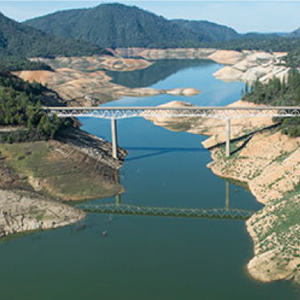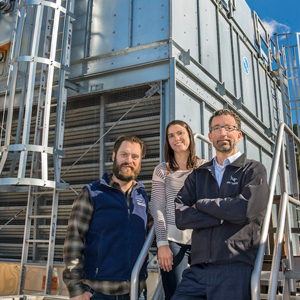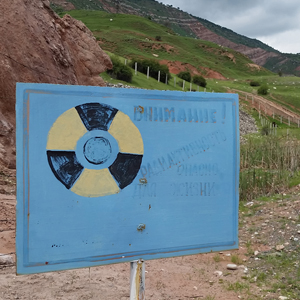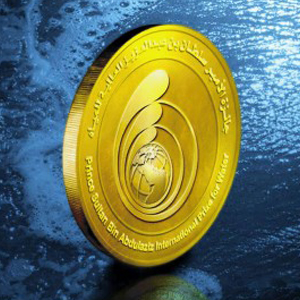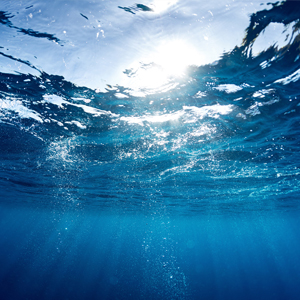- A nature-inspired hydrogen-bonded supramolecular complex for selective copper ion removal from waterAugust 7, 2020
Herein, we present a scalable approach for the synthesis of a hydrogen-bonded organic–inorganic framework via coordination-driven supramolecular chemistry, for efficient remediation of trace heavy metal ions from water. <read more>
- January 6, 2020
Berkeley Lab scientists demonstrate a “photo-thermal” umbrella that can double evaporation rates, thus reducing environmental impact of settling ponds. <read more>
Dec 30, 2019
Lab’s Peter Fiske featured in PopSci desalination story. <read more>
- October 10, 2019
A research consortium led by Berkeley Lab, along with three other national labs, will head a DOE desalination hub to provide secure and affordable water. <read more>
- August 26, 2019
Scientists use a powerful microbial detection device to show that suggestions of sewage in Kauai’s watershed were mostly false positives. <read more>
- August 26, 2019
As populations boom and chronic droughts persist, coastal cities like Carlsbad in Southern California have increasingly turned to ocean desalination to supplement a dwindling fresh water supply.
Now scientists at the Department of Energy’s Lawrence Berkeley National Laboratory (Berkeley Lab) investigating how to make desalination less expensive have hit on promising design rules for making so-called “thermally responsive” ionic liquids to separate water from salt. <read more> - August 26, 2019
Scientists at Berkeley Lab have been exploring different approaches for efficiently separating out salt and other contaminants to generate water that’s fit for drinking or other uses, such as agricultural irrigation. For example, they’re looking at charge-based brackish water desalination, nanoconfinement of water, better membranes, and other advanced water treatment techniques. <read more> - August 26, 2019
Drilling a single oil or natural gas well with hydraulic fracturing requires between 1.5 to 16 million gallons of water. When the well starts flowing, the fluid that is brought back to the surface alongside the oil and gas is a combination of the injection fluid and brine from aquifers – a difficult-to-treat mixture known as produced water. Brimming with hydrocarbons, harsh salts, and industrial chemicals, the vast majority of produced water is injected into disposal wells after it is collected. Currently, less than 1% of the billions of gallons generated each year is reused.
How can this “wastewater” be turned into usable water? One answer: Let microbes do the work. <read more> - August 26, 2019
The overpumping of groundwater in California has led to near environmental catastrophe in some areas – land is sinking, seawater is intruding, and groundwater storage capacity has shrunk. But researchers at the Department of Energy’s Lawrence Berkeley National Laboratory (Berkeley Lab) believe machine learning could be part of the solution to restoring groundwater to sustainable levels and quality. <Read more> - April 22, 2019
Water-purifying technology developed at Lawrence Berkeley National Lab (Berkeley Lab) was named among only five in the world that meet current international standards in a recent study from United Nations University examining systems for small communities. - February 1, 2019
Arian Aghajanzadeh has been accepted to participate in the Water Solutions Network (WSN) cohort this year. WSN is an immersive learning experience for future leaders in the water sector and we will be assigned to work on a real water challenge in California during this cohort. Based on his research experience in Ag and groundwater, he will be assigned a project in the Tulare basin. - January 28, 2019
About 80 Berkeley Lab scientists gathered at the ALS last week for an “ALS Water-Energy Outreach Forum” to discuss the challenges and opportunities arising from a growing focus on the nexus between water and energy—two resources essential to human populations—and to explore how the ALS can help address key questions in the field. <Read More> - August 9, 2018
Peter Fiske (EESA) wrote a piece published in R&D Magazine on research opportunities in creating sustainable water systems, including a look at water-energy research at the Lab.
- August 9, 2018
More than 200 attendees turned out to hear Berkeley Lab scientists speak on their research to develop solutions for a more secure and sustainable water future. With Peter Fiske, director of the Lab’s Water-Energy Resilience Research Institute (WERRI) as moderator, the panel included researchers Dan Miller, Peter Nico, and Chinmayee Subban. Topics covered include advances in membrane technology for ocean desalination; strategies to lower the cost of desalinating brackish groundwater, an under-utilized resource in California; how smart groundwater recharge strategies can help California increase its water supplies. <See Video> - June 25, 2018
Charuleka Varadharajan — a research scientist whose research uses data to inform sustainable water resource management — will speak on the plenary panel for the launch of the California Safe Drinking Water Data Challenge - June 4, 2018
Berkeley Lab scientists, Pouya Vahmani and Andrew Jones, find a cool way to save water. - April 26, 2018
Berkeley Lab researchers Peter Fiske, Erica Woodburn, and Peter Nico appeared on KCRA-TV Sacramento to discuss the challenges with California's water resources and infrastructure. - March 29, 2018
Recognizing that the issues of water and energy are critically interdependent, the Department of Energy’s Lawrence Berkeley National Laboratory (Berkeley Lab) is launching a new research institute to focus resources on its growing portfolio of projects for water innovation. March 14, 2018
A joint report released Wednesday says that 40 percent of the world's population is affected by water scarcity. More than two billion people are compelled to drink unsafe water, and more than 4.5 billion people do not have safely managed sanitation services.
- March 13, 2018
California, which grows so much of the country's food, continues to look for new strategies to hedge against drought. Jefferson Public Radio discusses groundwater recharge with Helen Dahlke at University of California-Davis and Peter Nico at Lawrence Berkeley National Laboratory.
- March 8, 2018
UC Berkeley Environmental Engineering Spring 2018 Seminar Series presents Professor Eric M.V. Hoek, Ph.D., (UCLA Engineering) presenting, "Impacts of water quality, membrane material and operating conditions on the performance and economics of MF/UF Membranes in water and wastewater treatment," Friday, March 9th, 2018, 12 – 1pm, 534 Davis Hall, UC Berkeley. - March 7, 2018
At the next WERRI seminar on March 12, Meagan Mauter of Carnegie Mellon University will discuss the use of high-resolution information at spatial and temporal scales relevant to underlying physicochemical and biological processes. The talk begins at 11:30 a.m. in Perseverance Hall and will be webcast via Zoom. More> - December 28, 2017
A new project by national laboratories and University of California campuses will study California’s water systems, from the headwaters in the Sierra Nevada, through rivers, reservoirs and groundwater in the Central Valley.
California relies on the Sierra Nevada snowpack for a significant portion of its water needs, yet scientists understand very little about how future changes in snowpack volume and timing will influence surface water and groundwater. Researchers Erica Woodburn and Carl Steefel of the Earth and Environmental Sciences Area are developing an advanced hydrologic model to study how climate change might affect California watersheds in the future. - Dec 20, 2017
Water and energy are resources that are linked, because generating energy requires water, often in large quantities, and energy is needed for pumping, treatment, and distribution of water and for collection, treatment, and discharge of wastewater. This interrelationship is often referred to as the water-energy nexus. The Molecular Foundry’s Jeff Urban details the challenges and opportunities in the WEN in a recent issue of Joule. - Dec 4, 2017
Experts from California’s water resource community gathered at the Berkeley International House to exchange ideas on how best to meet the need for open and transparent water data in California. Nearly 100 attendees from more than 60 organizations representing government, industry, water districts, universities, national laboratories, and the state legislature were in attendance. - 20 Oct 2017
Based on regional climate simulations of 18 California counties, Berkeley Lab researchers Pouya Vahmani and Andrew Jones found that widespread cool roof adoption could reduce outdoor water consumption by as much as 9 percent. Their study, “Water conservation benefits of urban heat mitigation,” was published in the journal Nature Communications. - 3 Aug 2017
Groundwater—the water stored underneath the Earth’s surface between the cracks and spaces in soil, sand, and bedrock—is essential for the California residents and farmers who rely on it for up to 46 percent of their annual water use. - 21 Jun 2017
Stormwater is an under-appreciated resource in California, and will be increasingly important as demand for freshwater increases, land use and vegetation shifts, and precipitation becomes more intense in coming years. - 12 Jun 2017
As an ecologist working with the Environmental & Earth Science Area (EESA)’s Watershed Scientific Focus Area (SFA)—a U.S. Department of Energy (DOE)-funded project aiming to understand the effects of water on a variety of biogeochemical processes—Dr. Heidi Steltzer and her research assistant, Chelsea Wilmer, spend a lot of time conducting fieldwork in the picturesque Colorado mountains. - 2 May 2017
Berkeley Lab names Dr. Peter Fiske to be the director of its Water-Energy Resilience Institute, a new position that underscores the Lab’s commitment to developing solutions for the challenges associated with the interdependence of water and energy systems. - 13 Apr 2017
Taking a page out of science fiction playbooks, Berkeley Lab's Dr. Omar Yaghi and colleagues have demonstrated a breakthrough MOF technology capable of generating water out of dry air using the power of the sun. The researchers describe their solar-powered harvester in the April 14 issue of the journal Science. - 18 Jan 2017
The San Geronimo Valley Planning Group has tapped Berkeley Lab and Gary Andersen, developer of the PhyloChip, to test the water to determine the sources that are contributing bacterial pathogens. The PhyloChip can identify and measure relative abundance of more than 50,000 microbial taxa, which in this context provides a “fingerprint” so contaminant sources can be tracked. - 29 Nov 2016
Tiny, glowing crystals designed to detect and capture heavy-metal toxins such as lead and mercury could prove to be a powerful new tool in locating and cleaning up contaminated water sources. - 20 Oct 2016
It has been nearly 10 years since our friend, colleague, leader, former Director of the Earth Sciences Division, passed away leaving the Earth Sciences family so abruptly at LBNL. The Special Issue will appear as part of the journal called, Water and will be dedicated to the memory of Bo, and will primarily focus on recent advances and future perspectives of vadose/unsaturated zone studies in various areas of the soil and hydrological sciences. Read the attached message from guest editor Dr. Boris Faybishenko here. - 20 Oct 2016
This presentation explores the energy-water-land (food) interactions that give rise to natural/engineered system dynamics. Robin Newmark is an Associate Laboratory Director at the National Renewable Energy Laboratory. Dr. Newmark has led or contributed to programs involving energy, climate and water issues, and the interdependence of water and energy systems. - 5 Oct 2016
Research led by Drs. Eric Dubinsky and Gary Andersen, microbial ecologists at Berkeley Lab’s Climate and Ecosystem Sciences Division, was published recently in the journal Water Research in an article titled, “Microbial source tracking in impaired watersheds using PhyloChip and machine-learning classification.” - 23 Sep 2016
On September 19, Berkeley Lab's Energy Geosciences Division Director, Dr. Jens Birkholzer announced Peter Nico as the new Program Domain Lead for Resilient Energy, Water and Infrastructure. - 11 Jul 2016
Berkeley Lab will lead the Watershed Function Scientific Focus Area (SFA) to quantify how perturbations to mountainous watershed—floods, drought, fire and early snowmelt—impact the downstream delivery of water, nutrients, carbon, and metals. - 30 Jun 2016
Earlier in June, the Department of Energy announced the selection of two Brine Extraction Storage Test (BEST) field projects that will test enhanced water recovery technologies for their potential to produce useable water from carbon dioxide (CO2) storage sites. Berkeley Lab researchers in the Energy Geosciences Division (EGD) will play a key role in BEST field project “Phase II Field Demonstration at Plant Smith Generating Station, near Panama City, Florida.” - 27 May 2016
Groundwater systems receive significant recharge in high-altitude headwater regions. Seasonal and longer term variations in surface temperature and precipitation are expected under a changing climate, which could substantially impact groundwater recharge and subsequently groundwater storage and discharge to surface waters downstream. This presentation by Dr. Shemin Ge from the University of Colorado-Boulder addresses this question as it relates to groundwater flow in headwater regions. - 23 May 2016
Billions of gallons of water are used each day in the United States for energy production—for hydroelectric power generation, thermoelectric plant cooling, and countless other industrial processes, including oil and gas mining. This interdependence of water and energy is the focus of a major new research effort at the Department of Energy’s Lawrence Berkeley National Laboratory (Berkeley Lab). - 23 May 2016
Berkeley Lab investigators are using fundamental research to address the interdependent challenges of water and energy, as regional climates change, and populations grow. The Berkeley Lab’s collective expertise can use both fundamental research and technological advances to meet these challenges. - 14 Apr 2016
California’s water supplies are facing unprecedented stresses, and the state’s water-management systems are struggling to meet both environmental and human needs (agricultural, municipal, industrial). - 21 Mar 2016
Berkeley Lab scientists in the Energy Geosciences Division (EGD) are conducting a study commissioned by California’s oil field regulating agency — the Division of Oil, Gas and Geothermal Resources — to examine possible links between oil field wastewater injection and earthquakes. - 22 Jan 2016
Is it safe to use treated oilfield wastewater to irrigate almond, pistachio and citrus groves? William Stringfellow, environmental engineer in Earth and Environmental Sciences (Energy Geosciences Division), says, “We’re not able to answer the public definitely, and say there’s no problem.” - 11 Dec 2015
The subsurface is being increasingly utilised both as a resource and as an energy and waste repository. Historically, there have been few issues of concern related to competition between resources, with groundwater contamination being a notable exception. - 18 Nov 2015
With California in an extreme drought, Lawrence Berkeley National Laboratory (Berkeley Lab) started a number of water conservation efforts two years ago. - 27 Aug 2015
This is a call for developing low-tech solutions to treat water contaminated by uranium mining in low income, developing countries. - 13 Apr 2015
Berkeley Lab earth scientist Kenneth Hurst Williams, recently featured in DOE JGI's collaborating science videos, describes the DOE-BER supported research activities at the Rifle, Colorado field site (Genomes-to-Watershed Scientific Focus Area (SFA2.0) and its relationship to other contaminated floodplains within the DOE complex. - 30 Mar 2015
Hydrocarbon production from unconventional resources and the use of reservoir stimulation techniques, such as hydraulic fracturing, has grown explosively over the last decade. - 8 Jul 2014
By day scientists at Lawrence Berkeley National Laboratory (Berkeley Lab) are researching ways to better tackle our country’s energy and environmental challenges. - NEWS CENTER Prince Sultan Bin Abdulaziz International Prize for Water to Berkeley Lab’s Ashok Gadgil9 Oct 2012
A team led by Lawrence Berkeley National Lab (Berkeley Lab)’s Ashok Gadgil is the recipient of the 5th Prince Sultan Bin Abdulaziz International Prize for Water. - LBNL is one of the main international research organizations addressing concerns about potential impact of deployment of CO2 geological storage on the nation’s groundwater resources.
- A nature-inspired hydrogen-bonded supramolecular complex for selective copper ion removal from waterAugust 7, 2020
Herein, we present a scalable approach for the synthesis of a hydrogen-bonded organic–inorganic framework via coordination-driven supramolecular chemistry, for efficient remediation of trace heavy metal ions from water. <read more>
- January 6, 2020
Berkeley Lab scientists demonstrate a “photo-thermal” umbrella that can double evaporation rates, thus reducing environmental impact of settling ponds. <read more>
Dec 30, 2019
Lab’s Peter Fiske featured in PopSci desalination story. <read more>- October 10, 2019
A research consortium led by Berkeley Lab, along with three other national labs, will head a DOE desalination hub to provide secure and affordable water. <read more>
- August 26, 2019
Scientists use a powerful microbial detection device to show that suggestions of sewage in Kauai’s watershed were mostly false positives. <read more>
- August 26, 2019
As populations boom and chronic droughts persist, coastal cities like Carlsbad in Southern California have increasingly turned to ocean desalination to supplement a dwindling fresh water supply. Now scientists at the Department of Energy’s Lawrence Berkeley National Laboratory (Berkeley Lab) investigating how to make desalination less expensive have hit on promising design rules for making so-called “thermally responsive” ionic liquids to separate water from salt. <read more> - August 26, 2019
Scientists at Berkeley Lab have been exploring different approaches for efficiently separating out salt and other contaminants to generate water that’s fit for drinking or other uses, such as agricultural irrigation. For example, they’re looking at charge-based brackish water desalination, nanoconfinement of water, better membranes, and other advanced water treatment techniques. <read more> - August 26, 2019
Drilling a single oil or natural gas well with hydraulic fracturing requires between 1.5 to 16 million gallons of water. When the well starts flowing, the fluid that is brought back to the surface alongside the oil and gas is a combination of the injection fluid and brine from aquifers – a difficult-to-treat mixture known as produced water. Brimming with hydrocarbons, harsh salts, and industrial chemicals, the vast majority of produced water is injected into disposal wells after it is collected. Currently, less than 1% of the billions of gallons generated each year is reused. How can this “wastewater” be turned into usable water? One answer: Let microbes do the work. <read more> - August 26, 2019
The overpumping of groundwater in California has led to near environmental catastrophe in some areas – land is sinking, seawater is intruding, and groundwater storage capacity has shrunk. But researchers at the Department of Energy’s Lawrence Berkeley National Laboratory (Berkeley Lab) believe machine learning could be part of the solution to restoring groundwater to sustainable levels and quality. <Read more> - April 22, 2019
Water-purifying technology developed at Lawrence Berkeley National Lab (Berkeley Lab) was named among only five in the world that meet current international standards in a recent study from United Nations University examining systems for small communities. - February 1, 2019
Arian Aghajanzadeh has been accepted to participate in the Water Solutions Network (WSN) cohort this year. WSN is an immersive learning experience for future leaders in the water sector and we will be assigned to work on a real water challenge in California during this cohort. Based on his research experience in Ag and groundwater, he will be assigned a project in the Tulare basin. - January 28, 2019
About 80 Berkeley Lab scientists gathered at the ALS last week for an “ALS Water-Energy Outreach Forum” to discuss the challenges and opportunities arising from a growing focus on the nexus between water and energy—two resources essential to human populations—and to explore how the ALS can help address key questions in the field. <Read More> - August 9, 2018
Peter Fiske (EESA) wrote a piece published in R&D Magazine on research opportunities in creating sustainable water systems, including a look at water-energy research at the Lab. - August 9, 2018
More than 200 attendees turned out to hear Berkeley Lab scientists speak on their research to develop solutions for a more secure and sustainable water future. With Peter Fiske, director of the Lab’s Water-Energy Resilience Research Institute (WERRI) as moderator, the panel included researchers Dan Miller, Peter Nico, and Chinmayee Subban. Topics covered include advances in membrane technology for ocean desalination; strategies to lower the cost of desalinating brackish groundwater, an under-utilized resource in California; how smart groundwater recharge strategies can help California increase its water supplies. <See Video> - June 25, 2018
Charuleka Varadharajan — a research scientist whose research uses data to inform sustainable water resource management — will speak on the plenary panel for the launch of the California Safe Drinking Water Data Challenge - June 4, 2018
Berkeley Lab scientists, Pouya Vahmani and Andrew Jones, find a cool way to save water. - April 26, 2018
Berkeley Lab researchers Peter Fiske, Erica Woodburn, and Peter Nico appeared on KCRA-TV Sacramento to discuss the challenges with California's water resources and infrastructure. - March 29, 2018
Recognizing that the issues of water and energy are critically interdependent, the Department of Energy’s Lawrence Berkeley National Laboratory (Berkeley Lab) is launching a new research institute to focus resources on its growing portfolio of projects for water innovation. March 14, 2018
A joint report released Wednesday says that 40 percent of the world's population is affected by water scarcity. More than two billion people are compelled to drink unsafe water, and more than 4.5 billion people do not have safely managed sanitation services.
- March 13, 2018
California, which grows so much of the country's food, continues to look for new strategies to hedge against drought. Jefferson Public Radio discusses groundwater recharge with Helen Dahlke at University of California-Davis and Peter Nico at Lawrence Berkeley National Laboratory. - March 8, 2018
UC Berkeley Environmental Engineering Spring 2018 Seminar Series presents Professor Eric M.V. Hoek, Ph.D., (UCLA Engineering) presenting, "Impacts of water quality, membrane material and operating conditions on the performance and economics of MF/UF Membranes in water and wastewater treatment," Friday, March 9th, 2018, 12 – 1pm, 534 Davis Hall, UC Berkeley. - March 7, 2018
At the next WERRI seminar on March 12, Meagan Mauter of Carnegie Mellon University will discuss the use of high-resolution information at spatial and temporal scales relevant to underlying physicochemical and biological processes. The talk begins at 11:30 a.m. in Perseverance Hall and will be webcast via Zoom. More> - December 28, 2017
A new project by national laboratories and University of California campuses will study California’s water systems, from the headwaters in the Sierra Nevada, through rivers, reservoirs and groundwater in the Central Valley.
California relies on the Sierra Nevada snowpack for a significant portion of its water needs, yet scientists understand very little about how future changes in snowpack volume and timing will influence surface water and groundwater. Researchers Erica Woodburn and Carl Steefel of the Earth and Environmental Sciences Area are developing an advanced hydrologic model to study how climate change might affect California watersheds in the future. - Dec 20, 2017
Water and energy are resources that are linked, because generating energy requires water, often in large quantities, and energy is needed for pumping, treatment, and distribution of water and for collection, treatment, and discharge of wastewater. This interrelationship is often referred to as the water-energy nexus. The Molecular Foundry’s Jeff Urban details the challenges and opportunities in the WEN in a recent issue of Joule. - Dec 4, 2017
Experts from California’s water resource community gathered at the Berkeley International House to exchange ideas on how best to meet the need for open and transparent water data in California. Nearly 100 attendees from more than 60 organizations representing government, industry, water districts, universities, national laboratories, and the state legislature were in attendance. - 20 Oct 2017
Based on regional climate simulations of 18 California counties, Berkeley Lab researchers Pouya Vahmani and Andrew Jones found that widespread cool roof adoption could reduce outdoor water consumption by as much as 9 percent. Their study, “Water conservation benefits of urban heat mitigation,” was published in the journal Nature Communications. - 3 Aug 2017
Groundwater—the water stored underneath the Earth’s surface between the cracks and spaces in soil, sand, and bedrock—is essential for the California residents and farmers who rely on it for up to 46 percent of their annual water use. - 21 Jun 2017
Stormwater is an under-appreciated resource in California, and will be increasingly important as demand for freshwater increases, land use and vegetation shifts, and precipitation becomes more intense in coming years. - 12 Jun 2017
As an ecologist working with the Environmental & Earth Science Area (EESA)’s Watershed Scientific Focus Area (SFA)—a U.S. Department of Energy (DOE)-funded project aiming to understand the effects of water on a variety of biogeochemical processes—Dr. Heidi Steltzer and her research assistant, Chelsea Wilmer, spend a lot of time conducting fieldwork in the picturesque Colorado mountains. - 2 May 2017
Berkeley Lab names Dr. Peter Fiske to be the director of its Water-Energy Resilience Institute, a new position that underscores the Lab’s commitment to developing solutions for the challenges associated with the interdependence of water and energy systems. - 13 Apr 2017
Taking a page out of science fiction playbooks, Berkeley Lab's Dr. Omar Yaghi and colleagues have demonstrated a breakthrough MOF technology capable of generating water out of dry air using the power of the sun. The researchers describe their solar-powered harvester in the April 14 issue of the journal Science. - 18 Jan 2017
The San Geronimo Valley Planning Group has tapped Berkeley Lab and Gary Andersen, developer of the PhyloChip, to test the water to determine the sources that are contributing bacterial pathogens. The PhyloChip can identify and measure relative abundance of more than 50,000 microbial taxa, which in this context provides a “fingerprint” so contaminant sources can be tracked. - 29 Nov 2016
Tiny, glowing crystals designed to detect and capture heavy-metal toxins such as lead and mercury could prove to be a powerful new tool in locating and cleaning up contaminated water sources. - 20 Oct 2016
It has been nearly 10 years since our friend, colleague, leader, former Director of the Earth Sciences Division, passed away leaving the Earth Sciences family so abruptly at LBNL. The Special Issue will appear as part of the journal called, Water and will be dedicated to the memory of Bo, and will primarily focus on recent advances and future perspectives of vadose/unsaturated zone studies in various areas of the soil and hydrological sciences. Read the attached message from guest editor Dr. Boris Faybishenko here. - 20 Oct 2016
This presentation explores the energy-water-land (food) interactions that give rise to natural/engineered system dynamics. Robin Newmark is an Associate Laboratory Director at the National Renewable Energy Laboratory. Dr. Newmark has led or contributed to programs involving energy, climate and water issues, and the interdependence of water and energy systems. - 5 Oct 2016
Research led by Drs. Eric Dubinsky and Gary Andersen, microbial ecologists at Berkeley Lab’s Climate and Ecosystem Sciences Division, was published recently in the journal Water Research in an article titled, “Microbial source tracking in impaired watersheds using PhyloChip and machine-learning classification.” - 23 Sep 2016
On September 19, Berkeley Lab's Energy Geosciences Division Director, Dr. Jens Birkholzer announced Peter Nico as the new Program Domain Lead for Resilient Energy, Water and Infrastructure. - 11 Jul 2016
Berkeley Lab will lead the Watershed Function Scientific Focus Area (SFA) to quantify how perturbations to mountainous watershed—floods, drought, fire and early snowmelt—impact the downstream delivery of water, nutrients, carbon, and metals. - 30 Jun 2016
Earlier in June, the Department of Energy announced the selection of two Brine Extraction Storage Test (BEST) field projects that will test enhanced water recovery technologies for their potential to produce useable water from carbon dioxide (CO2) storage sites. Berkeley Lab researchers in the Energy Geosciences Division (EGD) will play a key role in BEST field project “Phase II Field Demonstration at Plant Smith Generating Station, near Panama City, Florida.” - 27 May 2016
Groundwater systems receive significant recharge in high-altitude headwater regions. Seasonal and longer term variations in surface temperature and precipitation are expected under a changing climate, which could substantially impact groundwater recharge and subsequently groundwater storage and discharge to surface waters downstream. This presentation by Dr. Shemin Ge from the University of Colorado-Boulder addresses this question as it relates to groundwater flow in headwater regions. - 23 May 2016
Billions of gallons of water are used each day in the United States for energy production—for hydroelectric power generation, thermoelectric plant cooling, and countless other industrial processes, including oil and gas mining. This interdependence of water and energy is the focus of a major new research effort at the Department of Energy’s Lawrence Berkeley National Laboratory (Berkeley Lab). - 23 May 2016
Berkeley Lab investigators are using fundamental research to address the interdependent challenges of water and energy, as regional climates change, and populations grow. The Berkeley Lab’s collective expertise can use both fundamental research and technological advances to meet these challenges. - 14 Apr 2016
California’s water supplies are facing unprecedented stresses, and the state’s water-management systems are struggling to meet both environmental and human needs (agricultural, municipal, industrial). - 21 Mar 2016
Berkeley Lab scientists in the Energy Geosciences Division (EGD) are conducting a study commissioned by California’s oil field regulating agency — the Division of Oil, Gas and Geothermal Resources — to examine possible links between oil field wastewater injection and earthquakes. - 22 Jan 2016
Is it safe to use treated oilfield wastewater to irrigate almond, pistachio and citrus groves? William Stringfellow, environmental engineer in Earth and Environmental Sciences (Energy Geosciences Division), says, “We’re not able to answer the public definitely, and say there’s no problem.” - 11 Dec 2015
The subsurface is being increasingly utilised both as a resource and as an energy and waste repository. Historically, there have been few issues of concern related to competition between resources, with groundwater contamination being a notable exception. - 18 Nov 2015
With California in an extreme drought, Lawrence Berkeley National Laboratory (Berkeley Lab) started a number of water conservation efforts two years ago. - 27 Aug 2015
This is a call for developing low-tech solutions to treat water contaminated by uranium mining in low income, developing countries. - 13 Apr 2015
Berkeley Lab earth scientist Kenneth Hurst Williams, recently featured in DOE JGI's collaborating science videos, describes the DOE-BER supported research activities at the Rifle, Colorado field site (Genomes-to-Watershed Scientific Focus Area (SFA2.0) and its relationship to other contaminated floodplains within the DOE complex. - 30 Mar 2015
Hydrocarbon production from unconventional resources and the use of reservoir stimulation techniques, such as hydraulic fracturing, has grown explosively over the last decade. - 8 Jul 2014
By day scientists at Lawrence Berkeley National Laboratory (Berkeley Lab) are researching ways to better tackle our country’s energy and environmental challenges. - NEWS CENTER Prince Sultan Bin Abdulaziz International Prize for Water to Berkeley Lab’s Ashok Gadgil9 Oct 2012
A team led by Lawrence Berkeley National Lab (Berkeley Lab)’s Ashok Gadgil is the recipient of the 5th Prince Sultan Bin Abdulaziz International Prize for Water. - LBNL is one of the main international research organizations addressing concerns about potential impact of deployment of CO2 geological storage on the nation’s groundwater resources.
